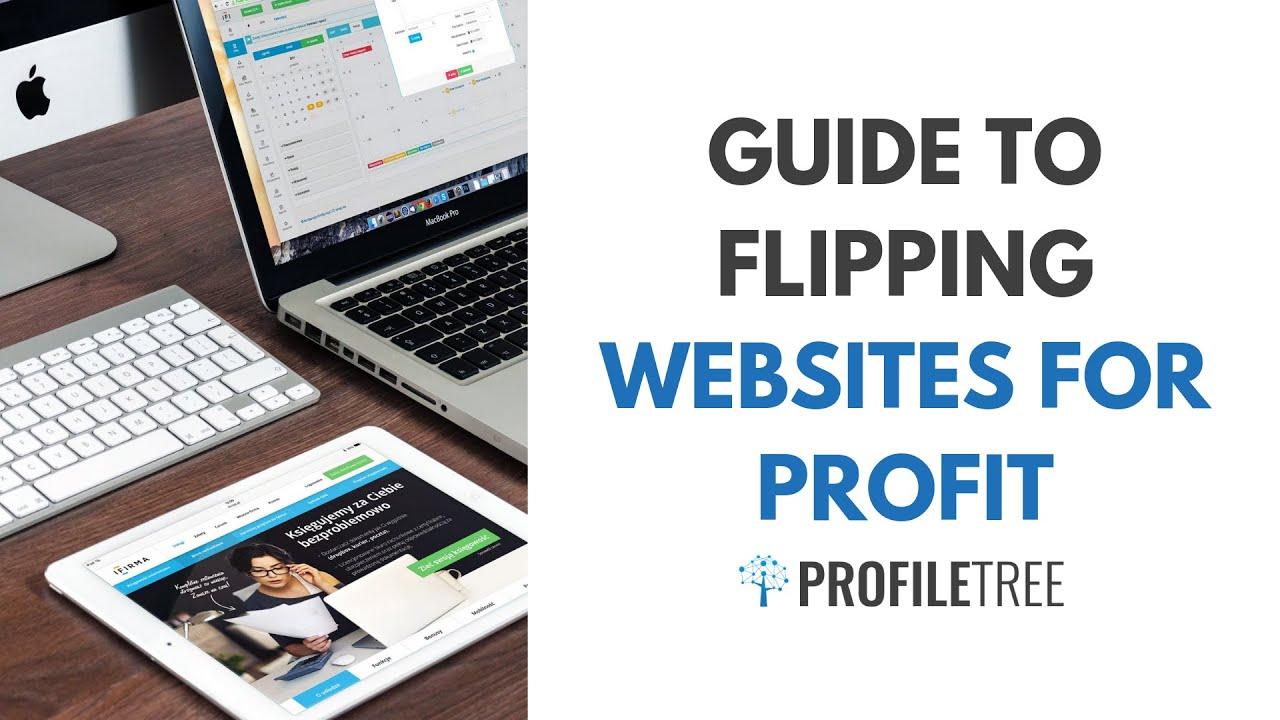Table of Contents
- Understanding the Concept of Website Flipping and Its Growing Popularity
- Identifying Profitable Niches for Successful Website Flips
- Essential Skills and Tools for Aspiring Website Flippers
- Evaluating a Website’s Potential Value Before Purchase
- Effective Strategies for Marketing and Selling Flipped Websites
- Q&A
- In Summary


Understanding the Concept of Website Flipping and Its Growing Popularity
Website flipping is an exciting opportunity within the digital landscape, transforming neglected online assets into profitable ventures. The process involves purchasing an existing website, enhancing its value through optimization or redesign, and then selling it for a profit. As businesses increasingly recognize the importance of a robust online presence, the demand for ready-made websites has risen sharply. Consequently, many entrepreneurs are diving into website flipping to capitalize on this trend.
Several factors contribute to the growing popularity of this practice. One key element is the accessibility of online tools and platforms that simplify the buying and selling process. Aspiring flippers can find platforms such as Flippa or Empire Flippers, which provide curated listings and market data. Additionally, social media effectively showcases listings, allowing sellers to reach a wider audience. The ease of website valuation based on traffic, revenue, and niche also empowers buyers to make informed decisions quickly.
However, prospective flippers should keep several considerations in mind to ensure their success. Here are some essential tips:
- Research: Thoroughly investigate the website’s history and performance.
- Due diligence: Assess traffic sources, revenue streams, and SEO standing.
- Invest wisely: Look for sites that can benefit from your expertise or improvements.
By understanding these elements of website flipping, individuals can navigate this thriving market with confidence and creativity.
Identifying Profitable Niches for Successful Website Flips
When diving into the realm of website flipping, pinpointing the right niche is crucial for maximizing profitability. A profitable niche not only attracts a steady stream of traffic but also caters to specific audiences with distinct needs. Analyzing market trends, identifying gaps in existing content, and understanding user demand can lead you to lucrative opportunities. Consider exploring areas that are underserved or emerging, as these often present less competition and greater potential for growth.
To assist in your niche selection, here are some promising niche categories to consider:
- Sustainable Living: The growing interest in eco-friendly products and lifestyle changes makes this a hot niche.
- Health and Wellness: Focus on specific areas such as mental health, nutrition, or alternative therapies.
- Remote Work Tools: Resources and tools for remote job seekers and digital nomads.
- Personal Finance: Insights on saving, investing, and managing money more effectively.
- Pet Care: Engaging content around pet training, health, and accessories.
Evaluating the competition within your chosen niche is equally important. Use tools like Google Trends, SEMrush, or Ahrefs to gauge the level of interest and competition surrounding potential keywords. Building a simple comparison table can help clarify which niches may be worth pursuing:
| Niche Category | Traffic Potential | Competition Level |
|---|---|---|
| Sustainable Living | High | Medium |
| Health and Wellness | Very High | High |
| Remote Work Tools | Medium | Medium |
| Personal Finance | High | High |
| Pet Care | Medium | Low |


Essential Skills and Tools for Aspiring Website Flippers
To become a successful website flipper, it’s crucial to develop a blend of technical skills and business acumen. First and foremost, understanding HTML, CSS, and JavaScript will empower you to make necessary modifications and enhancements to websites you purchase. Familiarity with WordPress or other content management systems is equally important, as these platforms dominate the online market. Additionally, acquiring skills in SEO can significantly enhance a website’s visibility, allowing you to maximize its value before resale.
Equipped with the right skills, you’ll also need to utilize a variety of tools that streamline the flipping process. Here are some essential tools that every website flipper should consider:
- Google Analytics: For monitoring website traffic and user behavior.
- SEMrush: To evaluate SEO performance and identify growth opportunities.
- Ahrefs: Use this for backlink analysis and keyword research.
- Flippa: A popular marketplace for buying and selling websites.
These tools will not only facilitate your website evaluations but also help you stay ahead in identifying trends that can drive more traffic. Below is a quick comparison table outlining the features of the tools mentioned:
| Tool | Main Features | Best For |
|---|---|---|
| Google Analytics | Traffic analysis, user behavior. | All website flippers. |
| SEMrush | SEO audits, keyword research. | SEO-focused projects. |
| Ahrefs | Backlink analysis, site audits. | Link-building strategies. |
| Flippa | Marketplace for buying/selling. | All levels of flippers. |
don’t underestimate the value of market research and networking within the flipping community. Joining forums and social media groups can provide you with insights into current trends and best practices. Engaging with other website flippers can also open doors to partnerships and collaboration, ultimately leading to increased success in your flipping endeavors. By honing these skills and leveraging available tools, you’re well on your way to establishing yourself as a formidable player in the website flipping arena.


Evaluating a Website’s Potential Value Before Purchase
When considering the purchase of a website, there are several key metrics that can indicate its potential value. Traffic analysis is crucial; assess the volume of visitors the site receives monthly and the consistency of that traffic over time. Tools like Google Analytics can provide insights into user demographics, geographical locations, and behavior patterns. Furthermore, a deeper look into the site’s SEO performance can reveal how well it ranks on search engines, examining metrics such as domain authority and backlinks.
Another aspect to scrutinize is the site’s monetization strategy. Understanding how the website generates income is vital for evaluating its sustainability and future earning potential. Look at various revenue streams including affiliate marketing, ads, eCommerce sales, or membership subscriptions. Analyzing the profit margins and stability of these income sources can help anticipate how the site might perform after the purchase.
Lastly, consider the website’s niche relevance and growth potential. Analyzing trends within the industry can provide insight into whether the niche is expanding or declining. Utilize tools like Google Trends to track niche popularity over time. An ideal investment would be a website in a growing sector with potential for expansion. Here’s a simple table to summarize the factors to consider:
| Evaluation Factor | Key Questions |
|---|---|
| Traffic Analysis | What is the monthly visitor count? How is the traffic consistency? |
| Monetization Strategy | How does the site make money? Are there multiple income streams? |
| Niche Relevance | Is the niche growing or declining? What are the market trends? |


Effective Strategies for Marketing and Selling Flipped Websites
When it comes to marketing flipped websites, a multifaceted approach can effectively attract potential buyers. Social media platforms such as Facebook, Twitter, and LinkedIn can serve as powerful tools for showcasing your flipped website. Create targeted ads or organic posts highlighting the key features and performance metrics of your site, such as traffic statistics, revenue potential, and niche audience engagement. Engaging visuals and infographics can help to illustrate these points more dynamically, capturing the attention of prospective buyers.
Another successful strategy involves listing your websites on specialized marketplaces. These platforms, geared specifically toward the buying and selling of websites, can provide significant exposure. Consider utilizing sites like
Lastly, consider leveraging email marketing to connect with potential buyers. Building a focused email list of interested parties allows for personalized communication that can significantly improve conversion rates. Crafting informative newsletters that maintain your subscribers’ interest can keep your flipped website at the forefront of their minds. Include case studies, success stories, and the latest updates related to your offerings, all while reinforcing your expertise in the website flipping industry.
Marketing Channel
Benefits
Considerations
Social Media
Widespread reach, direct engagement
Requires consistent interaction
Marketplaces
Targeted audience, built-in trust
Listing fees may apply
Email Marketing
Personalized outreach, targeted segments
Requires a solid email list
Q&A
Q&A: Website Flipping Job
Q1: What is website flipping?
A1: Website flipping is the process of buying an existing website, improving it, and then selling it for a profit. Much like real estate flipping, the key is to enhance the website’s value through various means—such as traffic generation, SEO optimization, and content upgrades—before selling it at a higher price.
Q2: How do I get started with website flipping?
A2: To dive into website flipping, start by researching and identifying profitable niches. Consider joining online marketplace platforms such as Flippa or Empire Flippers. Acquire your first website with potential for improvement, such as underperforming sites or those with untapped audiences. Familiarize yourself with SEO, digital marketing, and web design to effectively enhance your site.
Q3: What skills do I need for successful website flipping?
A3: Key skills for website flipping include:
Q4: How can I determine the value of a website?
A4: Website valuation depends on several factors, such as:
Considering these components can help you appraise a site effectively before buying.
Q5: What are some common mistakes to avoid in website flipping?
A5: Some pitfalls include:
Q6: Can anyone succeed at website flipping?
A6: Absolutely! While it requires dedication, research, and a willingness to learn, many individuals have found success in website flipping. With the right strategies and an understanding of the digital marketplace, anyone can build a profitable flipping career.
Q7: How long does website flipping take?
A7: The timeline can vary significantly. Improving a website may take anywhere from a few weeks to several months, depending on the scope of enhancements made and the strategies employed. For quick flips, some may see a return in as little as a few months, but for larger projects, patience is essential.
Q8: Is website flipping a sustainable job?
A8: Yes, website flipping can be a sustainable source of income if approached correctly. Continued investment in learning and adapting to market trends can lead to a steady flow of profitable flips. Additionally, factors such as recurring passive income from established sites can create a robust financial portfolio.
This Q&A provides a foundational understanding of website flipping, addressing common inquiries and concerns while guiding potential flippers towards successful ventures. Whether you’re just beginning or considering deeper involvement in the digital marketplace, continuous learning and strategic planning will be your allies in this exciting journey. In Summary
As we wrap up our exploration of the world of website flipping, it’s clear that this digital endeavor is more than just buying and selling; it’s an art form where strategy, creativity, and market savvy intertwine. Whether you’re a seasoned entrepreneur or a curious newcomer, the potential for profit and growth in website flipping is undeniable. With the right tools, knowledge, and a bit of patience, you can transform undervalued sites into thriving online assets.
Remember, success in website flipping doesn’t come overnight. It requires dedication, ongoing learning, and a keen eye for market trends. As you embark on or continue your website flipping journey, keep honing your skills, stay updated with industry changes, and engage with the vibrant community around you.
So, are you ready to take the plunge into the exciting realm of website flipping? Your next profitable venture could be just a click away!

